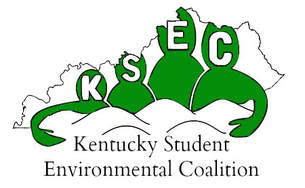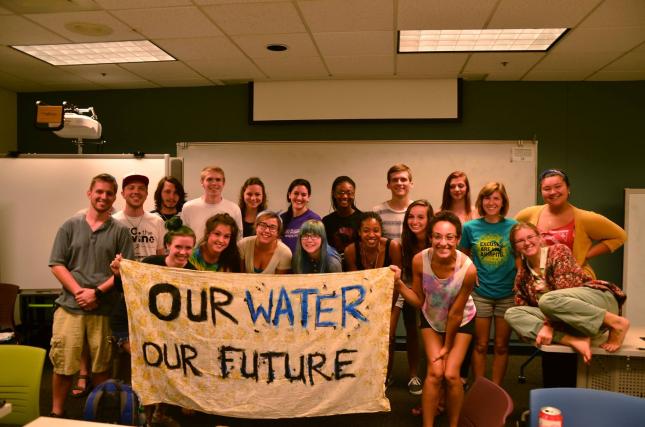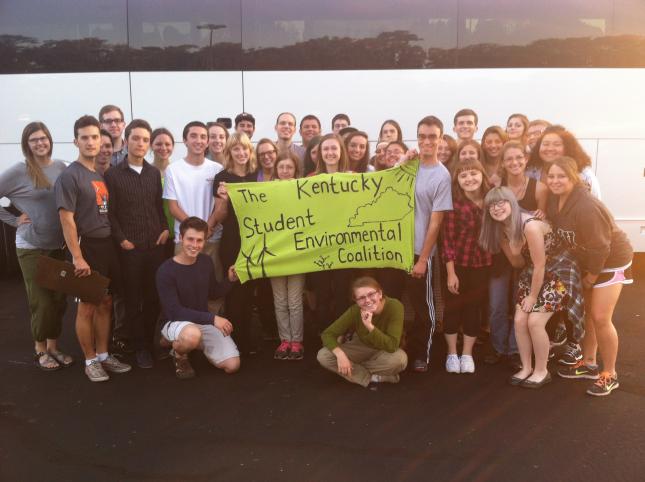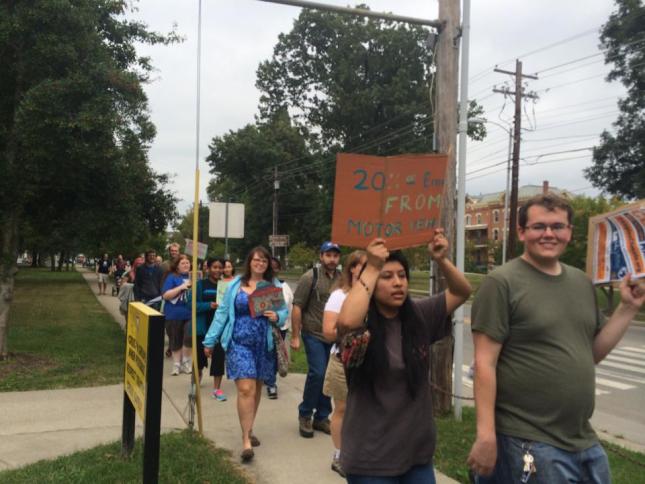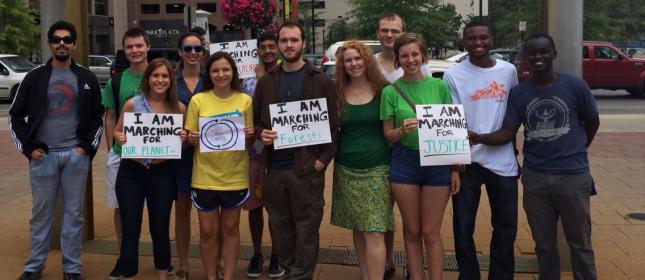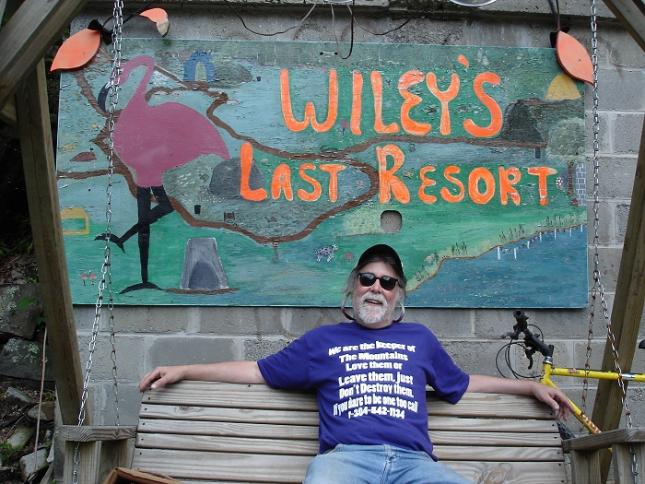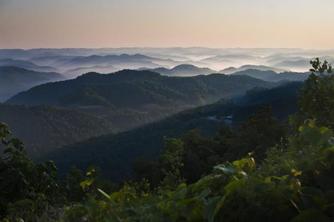|
By Cameron Baller: UK Greenthumb, Just Transition Working Group Steering Committee, Pipelines and Natural Gas Working Group The 2016 presidential election threw every federal agency for a spin, few more so than the Federal Energy Regulatory Commission (FERC). A little known agency, the FERC is responsible for regulating nuclear energy and oil and gas pipeline infrastructure, among other things. After Donald Trump was elected, members of the FERC leadership quit abruptly, leaving the agency without enough administrators to make decisions. They had been stuck in limbo, stalling all new regulations and decisions about pipelines. This purgatory is where the Kinder Morgan Pipeline project has been for the past few months… but no longer. This dangerous pipeline project is lurking under our radar and it is critical that we prepare now so that we can stop it in its tracks. Read on for more information and to learn how to join us in stopping this pipeline. 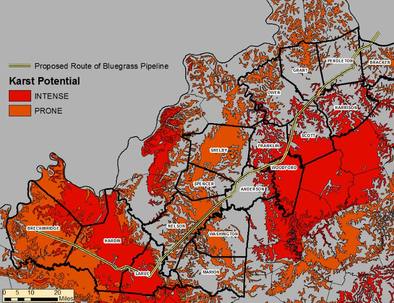 Not Kentucky’s First Rodeo There is a storied legacy of companies trying to snake dangerous pipeline infrastructure through Kentucky. In 2013, the Williams and Boardwalk Pipeline Partners proposed the Bluegrass Pipeline. In an effort to intimidate landowners into selling their land for the construction of the pipeline, the company told landowners that it would use eminent domain to take their land for the project, which would be a bad financial deal for the landowners. A broad array of constituents came together, including landowners, advocacy groups, policymakers, and even a group of singing nuns to fight the project. Several landowners formed a blockade, refusing to sell their land to the pipeline company, while other allies pursued legal action. In 2015, the Kentucky court system determined that the Bluegrass Pipeline could not use eminent domain to seize land for the project, functionally stopping the pipeline. The court ruling hinged on a key fact: the pipeline was carrying natural gas liquids (NGLs) and NOT natural gas. NGLs are not methane and are not used primarily for energy. They are co-products that are obtained, along with methane, from the natural gas extraction process. Rather than being used for heat and power, they are used as inputs for plastics and chemical manufacturing. This distinction was critical in the court’s eminent domain decision. Another important distinction between NGLs and natural gas is that NGLs vaporize and, because of their relative weight, displace the air. In simple terms, this means that when an NGL pipeline leaks, the vapors could suffocate anyone and everyone within the leak area. 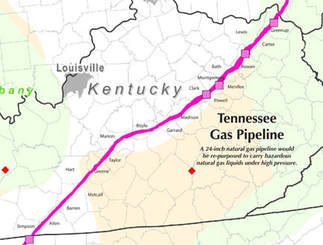 Credit: Kentuckians For The Commonwealth Credit: Kentuckians For The Commonwealth A New Pipeline Waiting to Strike Not long after the Bluegrass Pipeline was defeated, Kinder Morgan began exploring their own NGL pipeline project. This time, the dangers are even more severe. The Tennessee Gas Pipeline is owned by a subsidiary of Kinder Morgan and has carried actual natural gas from South to North for over 70 years. Now, Kinder Morgan hopes to “abandon” this pipeline (to do so, it must first get the approval from the FERC) and then sell the pipeline to another one of its subsidiaries, the Utica-Marcellus Texas Pipeline (UMTP). UMTP would re-purpose the pipeline, flip the flow so that it goes from North to South, and send NGLs along the pipeline instead of natural gas. There are a few important reasons this project is even more dangerous than the Bluegrass Pipeline. The existing pipeline is more than 70 years old, therefore subject to the normal wear and tear that 70 years of use will bring, and no longer meets today’s pipeline construction safety standards. In an area with geology as dangerous as Kentucky’s infamous karst, where sinkholes gobble up several Corvettes at a time, it is terrifying to think that we are considering transporting dangerous NGLs by pipeline, let alone transporting them through a pipeline so old and out of standard. Furthermore, they are both flipping the flow of the pipeline and sending new materials down it, these are both stressors that the pipeline has not been subjected to and could present unpredictable problems and an increased risk of leaks. Finally, Kinder Morgan observed and learned from the Bluegrass Pipeline fight. In re-purposing an existing pipeline, they may be able to utilize the existing land easements, circumventing the need for eminent domain. These tactics go against the clear demands of Kentuckians and require new and creative strategies in response. Re-organizing in the New Landscape
In August, the FERC regained quorum after Trump appointed new commissioners to the agency. Given the political leanings of these appointees, we should not be surprised when they approve Kinder Morgan’s request to “abandon-in-place,” functionally granting the company a blank check to do the re-purposing. As the official comment period is over, and the die seem to be cast in terms of the FERC, it seems like the most important action now would be to prepare for that announcement and get out ahead of it. The good news is we are not beginning from scratch. Organizations across Kentucky have been working on this issue since the beginning, including the Kentucky Resources Council (KRC), Kentucky Heartwood, Kentuckians for the Commonwealth (KFTC), the Kentucky Environmental Foundation, among others. However, organizing efforts have stalled as the FERC lost its ability to make decisions. It is essential that we now re-energize resistance efforts before it is too late. With that goal in mind, the Kentucky Student Environmental Coalition (KSEC) has created a new Pipelines and Natural Gas Working Group (PNWG), which is focused on stopping the Kinder Morgan Pipeline project. We plan to work with other state and campus organizations, local communities and government officials to create a multi-layered resistance effort sufficient to block the project. We cannot hope to tackle this issue alone. Following the lead of the Bluegrass Pipeline resistance movement, we hope be a part of creating a diverse resistance movement across the state that can demonstrate a unified voice against the pipeline. We are more powerful than Kinder Morgan, but only together. In the coming weeks and months, we will be reaching out to a variety of stakeholders and developing tactics that allow everyone to be a part of this resistance. For now, informing yourself on this issue and preparing to become a part of the response effort are critical. We will fight for our future and we will no longer be ignored.
0 Comments
I'm All About Manufacturing Jobs, Just Not at the Price of Kentucky's Environment and Public Health6/7/2017 By Cameron Baller, UK Greenthumb I attended the Kentucky Manufacturer's Conference and Trade Show as a member of the Kentucky Student Environmental Coalition. I support bringing manufacturing jobs to Kentucky and I was curious to learn more about the industry. But instead of hearing about ways government and industry officials are working to bring safe, well-paying jobs to one of our nation’s poorest states, I got an earful of jubilation for cutting safeguards and regulations that protect our workers, communities, and environment.
Going into the conference, I was expecting explanations of why the economy should be prioritized over the environment. What I was not expecting was a near total disregard for environmental issues like climate change and water protection. It wasn’t just that the environment was less important, it was entirely unimportant. And if Kentucky’s manufacturing industry finds the environment worthless, it follows that the industry also finds the people in the environment worthless. At one point, Kentucky Energy and Environment Cabinet Secretary Charles Snavely, former Arch Coal executive, listed off all of the environmental policies that President Trump has rolled back, grinning the whole way through as if it was so grand that many more people will now suffer the health impacts of having to drink polluted water and breathe toxic air. The person charged with protecting Kentucky’s land, water, and air applauded the approval of the Dakota Access and Keystone XL pipelines, the removal of critical stream protections, and the scrapping of the Clean Power Plan. Later in the conference, there was a panel on pipelines and a Marathon Petroleum representative basically said that all of the protests of pipelines were not about water contamination, explosions, or land rights, but were some kind of liberal façade to block the fossil fuel industry. He went on to say the dangers of leaks were miniscule. But when I asked him how much could leak from a pipeline before being detected, he said hundreds of barrels. Let me restate that, if there is a leak that is smaller than “hundreds of barrels,” let’s say 100 or 200 barrels, they would not even know that the leak had occurred. Our water would be contaminated and we wouldn’t even know. The fact that a fossil fuel representative can totally dismiss environmental activists in one breath and then state that there could be hundreds of barrels of oil leaking into our groundwater and no one would know about it is absolutely absurd. The tone of the Kentucky Manufacturer’s Conference should remind us of two important responsibilities. First, we must never let politicians like Trump or Bevin get into office, especially because they won’t be alone, they will bring the Pruitts and Snavelys of the world who will only multiply the destruction they bring onto our people and planet. Second, we must hold corporations accountable. Marathon should not be allowed to operate a pipeline if they can’t detect a hundred barrel leak. Corporations in Kentucky and across the country are getting away with murder because they have politicians in their pockets. It is time to vote with our ballots, vote with our wallets and make ourselves heard. By Sammy Meador, Intern, KY Student Environmental Coalition
By Nicholas Johnson, University of Louisville, University of Louisville 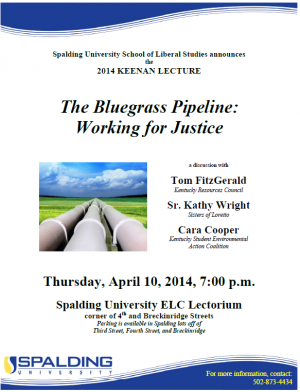 The School of Liberal Studies at Spalding University in Louisville hosted its annual Keenan Lecture on the topic of the Bluegrass Pipeline. In the interdisciplinary spirit of the School of Liberal Studies, this topic was chosen to explore the interconnections of religion with politics and environmental justice in the case of the pipeline project. The school’s chairwoman, Dr. Pattie Dillon, says that they “chose the Bluegrass Pipeline as the topic for this year’s lecture because it ties to the School of Liberal Studies’ theme this year—the natural environment—and because it links to the university’s mission of social justice and responding to the needs of the times in terms of the environment and the promotion of peace and justice.” The Bluegrass Pipeline project is a perfect example of conflict in the intersection of the natural environment and social justice. The proposed pipeline, a partnership of Williams Company and Boardwalk Pipeline Partners, is a buried 24” pipe that would transport hazardous natural gas liquids—a byproduct of hydraulic fracturing—from natural gas fields in the northeast, across more than a dozen Kentucky counties and several other states, and to the Gulf coast for refining and export. While it is clear that more fracking is not a good thing and that the environmental damages of the extraction and burning of fossil fuels are apparent, this particular case demonstrates several other ways in which Big Energy threatens social and environmental justice. The first panelist to speak was Sister Kathy Wright of the Sisters of Loretto. These nuns, who reside in the Kentucky’s ‘holy land,’ live by the motto “We work for justice and act for peace because the Gospel urges us.” The Sisters of Loretto have become strong opponents to the project for two significant reasons. First, the proposed path of the pipeline crosses lands owned by the group. In their pursuit of cleaner energy and environmental stewardship, the nuns had a pretty good reason to say “Not in our back yard!” But even once the surveyors were refused permission to route the pipeline through their property, the nuns did not give up the fight. As sister Wright said, the gospel gives them a sense of duty to protect the land and the people. As members of creation, they have a “big back yard.” The nuns recognize that projects such as the Bluegrass Pipeline won’t just affect them and their immediate neighbors, but represent a larger conflict that bring social and environmental injustice to their neighbors across the world. Following on the heels of the faith perspective was Cara Cooper, the statewide coordinator for the Kentucky Student Environmental Coalition(KSEC), representing students and young people who oppose and would be impacted by the pipeline. Ms. Cooper described some of the ways in which students had responded to the threat of the Bluegrass Pipeline by organizing, rallying, petitioning, and working hard to stop the pipeline. At Kentucky State University, pipeline employees surveyed school property without permission, showing no respect for proper protocol and procedure, and no concern for the sanctity of institutions of higher education. Such offenses caused a powerful group of student from across the state to devote their efforts to stopping the project, even if it did not immediately impact them or their campuses. Ms. Cooper, KSEC, and Kentucky students clearly share a concern for others and their planet as a whole as evidence by their efforts to stop the pipeline. The pipeline companies are coming to realize that they have made a mistake trying to bully their way across the state by buying off rural landowners and threatening to evict those who aren’t for sale by abusing the powers of eminent domain. After their claims that the project would be good for Kentucky were debunked, they have changed their tune to try to appeal to some misguided sense of patriotism and nationalism. The companies have essentially been called out on the benefits to the state, and now are saying “Yeah, sure, maybe it won’t help Kentucky directly, but think of all the American made energy this will produce, and how much of a step towards energy independence it represents!” (As if we don’t all know that these liquids are dirty fossil fuels intended for export to the rest of the world.) But, as Ms. Cooper pointedly concluded, “there is nothing energy independent or American about it!” Tom FitzGerald, the director of the Kentucky Resources Council, concluded the talk by offering a legal perspective of the project. For one, the threat of use of eminent domain for a project that does not benefit society as a whole (as a dam or road may) is an abuse that threatens fundamental private property rights. Additionally, since natural gas liquids are not regulated at a national level by the Federal Energy Regulatory Commission, they essentially occupy a regulatory free-zone due to the so-called ‘Halliburton loophole.’ Dr. Fitzgerald outlined several ways that citizens can take direct action to put pressure on lawmakers and regulators to close these loopholes and start properly regulating projects like the Bluegrass Pipeline. His four suggested ways to impact the project are:
By Cara Cooper When did it become acceptable to just say whatever it is you need to get your way? At one time there was something that we all valued more than money, more than jobs, and it was a little thing called the truth. You know, I listen to these pony-show presentations put on by the Bluegrass Pipeline companies and just get so upset, because it seems to me that they have no qualms about stretching, and bending, and molding the truth. In fact, many of the things they have said recently have been outright lies and contradictions of things they told us early on in this process. I often wonder how these representatives sleep at night, how many Ambien it takes for them to drift off to dreamless sleep in their large, plush beds in their big, fancy homes.
Lies perpetrated by the Bluegrass Pipeline Companies. Number one, energy independence. This pipeline has absolutely nothing to do with energy. NGLs are mostly used to make plastics and they have no intention of keeping the bulk of that product in the U.S. Number two, jobs for Kentuckians. They talk about creating jobs for us here in Kentucky in one breath, and then spout that they will be creating a local economy boom when their workers stay in local hotels. Um, if the workers live here, why the heck do they need hotels? Number three, they want to be a good neighbor. If my neighbors were sneaking around on my property and surveying without permission, like many properties have been, there would be a feud starting in no time. Number four, their top priority is safety. It goes without saying that their top priority is money in their pockets, and all it takes is one look at the safety record of Williams Company to throw that lie right out the window. Let’s be real folks, I know a lot of us are hurting for jobs, but let’s not let our desperation lead us to some irreversible disaster that could endanger our lives, ruin our water supply, damage our farmlands, lower our property values, and pollute our earth. Especially not for the few and temporary jobs that this project would create for here at home. Stand in solidarity with those who are the front lines of this pipeline project. Call your state senators and representatives and make sure they know that we don’t want NGL pipelines in Kentucky and private corporations should not get the right of eminent domain to carry dangerous, toxic liquids through our state for the benefit of themselves and other countries. If this issue comes up for a vote, I can guarantee that the representatives along the pipeline route have already heard from their constituents and know to vote against the project, make sure your representatives know how to vote, too. Call 502-564-8100 and ask for your senator and you will be connected with their office. |
AboutThe Young Kentuckian is a blog of the Kentucky Student Environmental Coalition where youth share their work and ideas for Kentucky's bright future. Follow The Young Kentuckian on Facebook!
Categories
All
Archives
March 2023
|
